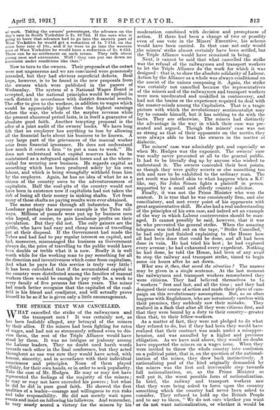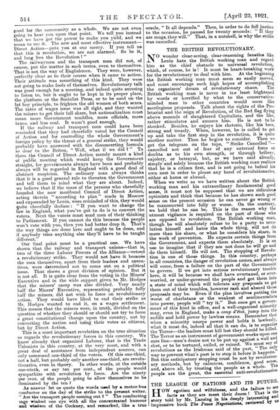111E STRIKE THAT WAS CANCELLED.
WHAT cancelled the strike of the railwaymen and the transport men It was certainly not, as has been foolishly alleged, any betrayal of the miners by their allies. If the miners had been fighting for rates of wages,. and had not so strenuously refused even to dis- cuss them, the rest of the Triple Alliance would have stood by them. It was no intrigue or jealousy among the Labour leaders. They no doubt used harsh words towards each other in the final conference, but they acted throughout as one was sure they would have acted, with honour, sincerity, and in accordance with their individual consciences and principles. None of them played Selfishly, for their own hands, or in order to seek popularity. Take the case of Mr. Hodges. He may or may not have represented the feelings of the majority of the miners ; he may or may not have exceeded his powers but .what be did he did in pure good faith. He showed the first qualities of a leader--courage and willingness to run risks and take responsibility. He did not merely wait upon events and insist on following his folloWers. And remember, he very nearly scored. a victory for the miners by his moderation_ combined with decision and promptness of action. If there had been a ehange of two or possibly even of one vote in the Miners' Executive, his scheme would have been carried. In that case not only would the miners' strike almost certainly have been settled, but the Triple Alliance would have remained in being. Next, it cannot be said that what cancelled the strike was the refusal of the railwaymen and transport workers to let the Triple Alliance do the work for which it was designed : that is, to show the absolute solidarity of Labour. Action by the Alliance as a whole was always conditional on the assent of the unions composing it. Again, the strike was certainly not cancelled because the representatives of the miners and of railwaymen and transport workers were men uneducated and unskilled in controversy, and had not the brains or the experience required to deal with the master-minds among the Capitalists. That is a tragic picture with which the revolutionary sentimentalist may try to console himself, but it has nothing to do with the facts. They are otherwise. The miners had distinctly the advantage in the way in which their case was pre- sented and argued. Though the miners' case was not as strong as that of their opponents on the merits, they were always able to beat the owners in the matter of dialectic.
The miners' case was admirably put, and especially so when Mr. Hodges was the exponent. The owners' case was really never presented at all to the general public. It had to be literally dug up by anyone who wished to understand it. The owners concealed their best points, as though they were guilty secrets or else something too rich and rare to be exhibited to the ordinary man. The net result was indeed akin to what happens when a K.C. like, say, Sir John Simon fights a plaintiff in person, supported by a small and elderly country solicitor.
Finally, it was not the Prime Minister who won the contest. It is true that he was consistently firm, and else conciliatory, and met every point of his opponents with great argumentative skill. He also had a real understanding of the principles of his own case, and indeed set an example of the way in which Labour controversies should be man- aged. It cannot possibly be said, however, that it was he who prevented the general strike. When the amazing telegram was ticked out on the tape, " Strike Cancelled," he had only just finished explaining to the House how all had been done that could be done, and all had been done in vain. He had tried his best ; he had explored every avenue ; he had exhausted every expedient. Nothing he had done, he told the House, had been of any avail to stop the railway and transport strike, timed to begin some six hours after he sat down.
What was it, then., that saved the situation ? The answer may be given in a single sentence. At the last moment the railwaymen and transport workers remembered they were citizens. They had believed themselves to be " workeis " first and last, and all the time ; and they had designed their course of action and made their plans of cam- paign on this revolutionary assumption. But, as so often happens with Englishmen, who are notoriously careless with their premises, they suddenly saw their mistake. They realized in a flash that after all they were citizens first, and that they were bound by a duty to their country—greater than that, to their fellow-workers.
As a matter of fact, they were not pledged to do what they refused to do, but if they had been they would have realized that their contract was made under a misappre- hension, and was annulled by a higher and previous obligation. As we have said above, they would no doubt have supported the miners on a wages issue. When they were invited to throw the whole country into confusion on a political point, that is, on the question of the national- ization of the mines, they drew back instinctively. A nationalizing pool of the kind originally demanded by the miners was the first and irrevocable step towards full nationalization, or, as the Prime Minister so well put it, the worst possible form of nationalization. In brief, the railway and transport workers saw that they were being asked to force upon the country something which the country had never been asked to consider. They refused to hold. up the British People and to say to them, " We do not care whether you want or do not want nationalization, or whether it would be good for the community as a whole. We are not even going to hear you upon that point. We tell you instead that we have got the power to make you yield, and we mean to use it. The new and moat effective instrument— Direct Action—puts you at our mercy. If you tell us that this is revolution, we are not alarmed. So be it, and long live the Revolution " The railwaymen and the transport men did not, of course, put the matter in such terms, even to themselves. That is not the way of Englishmen. They were, however, perfectly clear as to their course when it came to action. Their attitude was something of this kind. They were not going to make fools of themselves. Revolutionary talk was good enough for a meeting, and indeed quite amusing to listen to, but it ought to be kept in its proper place, the platform or the Socialist Press, or to be used on the fat boy principle, to frighten the old women of both sexes. The rates of wages issue was all right, and they wanted the miners to get their full share, but nationalization must mean more Government muddles, more officials, more taxes, and less coal. It wasn't good enough.
If the railway and transport men could have been reminded that they had cheerfully voted for the Council of Action and for controlling the whole Government's foreign policy by the threat of a general strike, they would probably have answered with the disconcerting formula so dear to the Briton, " Well, what if we did ? " To them the Council of Direct Action merely meant a kind of public meeting which would keep the Government straight, for governments always have been and probably always will be regarded in England with a good deal of abstract suspicion. The ordinary man always thinks that it is a good general rule to threaten the Government and tell them to mind what they are about. Indeed, we believe that if the mass of the persons who cheerfully founded the now moribund Council of Direct Action, acting therein " according to plan " made in Moscow and expounded by Lenin, were reminded of this, they would quite cheerfully declare : " If you want to change the law in England, what you've got to do is to convert the voters. Next the voters must send men of their thinking to Parliament. If you cannot do this because the people won't vote with you, then you had better drop it. That's the way things are done here and ought to be done, and if anybody tries anythiUg else they'll have to be taught different."
Our final point must be a practical one. We have shown that the railway and transport unions—that is, two of the three Labour Powers of the Alliance—vetoed a revolutionary strike. They would not have it because the men themselves, apart from their leaders and execu- tives, were determined not to come out on a political issue. That shows a great division of opinion. But it is not all. It is quite clear from the voting in the Miners' Executive and in the wide support given to Mr. Hodges that the miners' camp was also divided. Very nearly half the Miners' Executive, representing probably fully half the miners, did not wish to force on revolutionary action. They would have liked to end their strike as Mr. Hodges wanted to end it, on a wages settlement. This means that the miners were, in truth, divided on the question of whether they should or should not try to force a great constitutional change upon the country, not by converting the nation and using their votes as citizens, but by Direct Action.
This is a most important revelation on the true situation as regards the revolutionary forces in this country. We know already that organized Labour, that is the Trade Unionists in this country, at the very most, and with a great deal of assistance from independent sources, can only command one-third of the voters. Of this one-third, not a half, but probably only another one4hird, are revolu- tionaries, even in theory. In other words, at the outside one-ninth, or say ten per cent., of the people would sympathize with revolution by force. Are the ninety per cent. of the people going to allow themselves to be dominated by the ten ? As answer let us quote the words used by a motor-bus conductor on the day of the strike to the present writer. " Are the transport people coming out 3 " The conducting sage winked one eye with all the concentrated humour wisdom of the Cockney, and remarked, like a true oracle, " It all depends." Then, in order to do full justice to the occasion, he paused for twenty seconds : " If they are mugs, they will." That, in a nutshell, is why the strike was cancelled.



































 Previous page
Previous page